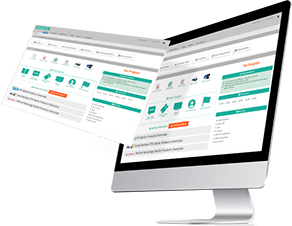Managing multi-state tax preparation presents unique challenges that can overwhelm even experienced tax professionals. With clients increasingly mobile and businesses operating across state lines, the ability to efficiently handle multi-state tax requirements has become essential for practice growth and client satisfaction.
UltimateTax’s comprehensive multi-state capabilities eliminate the complexity and additional costs typically associated with preparing returns for clients in California, Texas, Florida, New York, Illinois, and all other states. Whether you’re serving snowbirds with properties in multiple states or handling corporate clients with nationwide operations, understanding multi-state tax software requirements is crucial for success.
This complete guide explores the essential features, state-specific considerations, and workflow optimization strategies that make multi-state tax preparation profitable and efficient. From California’s complex state tax requirements to Texas’s business-friendly environment, we’ll cover what tax professionals need to know to serve clients effectively across all 50 states.
Understanding Multi-State Tax Complexity
Multi-state tax preparation involves far more than simply filing returns in multiple jurisdictions. Each state maintains its own tax laws, forms, filing deadlines, and compliance requirements that must be carefully navigated to avoid penalties and ensure accurate filings.
California leads the nation in tax complexity with its high state income tax rates, numerous credits and deductions, and strict compliance requirements. According to the California Franchise Tax Board, the Golden State requires specialized knowledge of forms like the 540, 540NR, and various schedules that don’t exist in other states. Tax professionals serving California clients must stay current with frequent law changes and understand the state’s aggressive audit procedures.
Texas presents a different challenge with no state income tax but complex business tax requirements including the franchise tax and various local tax obligations. Florida offers similar individual tax advantages but requires understanding of specific business registration and sales tax requirements that vary significantly from other states.
New York’s tax system combines high state rates with complex local tax obligations, particularly in New York City, where additional taxes and compliance requirements can catch unprepared professionals off guard. The IRS guidance on state and local tax deductibility provides essential federal context for understanding how state obligations interact with federal requirements. Illinois rounds out the major states with its own unique combination of state and local tax requirements that demand specialized software capabilities.
Key Multi-State Challenges Include:
- Varying residency rules and definitions
- Different treatment of retirement income
- State-specific credits and deductions
- Reciprocity agreements between states
- Apportionment rules for business income
- Filing deadline variations
Essential Software Features for Multi-State Tax Preparation
Professional multi-state tax software must go beyond basic form preparation to provide comprehensive support for complex cross-jurisdictional scenarios. The most critical feature is automatic calculation and validation across all states, ensuring that residency rules, apportionment formulas, and state-specific requirements are correctly applied without manual intervention.
Real-time updates for state law changes prove essential as states frequently modify their tax codes throughout the year. Software that automatically downloads and applies these changes prevents costly errors and ensures compliance with the latest requirements. UltimateTax’s system provides these updates automatically across all 50 states without additional fees or manual downloads.
Integrated e-filing capabilities streamline the submission process by allowing federal and state returns to be filed simultaneously from a single platform. This eliminates the need to access multiple state systems or manage separate login credentials for each jurisdiction. UltimateTax’s unlimited e-filing feature provides seamless submission across all states, making it ideal for practices with multi-state clients. The ability to track return status across all states from one dashboard saves significant time during busy filing periods.
Data flow between states becomes crucial when clients have income or deductions that affect multiple jurisdictions. Advanced software automatically carries forward relevant information between state returns, ensuring consistency and reducing the risk of discrepancies that could trigger audits or penalties.
State-Specific Considerations for Major Markets
California tax preparation requires specialized attention to the state’s unique approach to federal conformity and numerous state-specific adjustments. The state’s complex Alternative Minimum Tax (AMT) calculations, extensive itemized deduction limitations, and specific treatment of federal tax reform provisions demand software that can accurately navigate these intricacies.
California’s strict e-filing requirements and penalties for non-compliance make reliable software integration with the state’s systems essential. The Franchise Tax Board’s aggressive enforcement of filing deadlines and accuracy requirements means that software must provide robust diagnostic checking and validation before submission.
Texas business tax preparation focuses heavily on the franchise tax, which applies to most business entities operating in the state. Understanding the various calculation methods, exemptions, and apportionment rules requires software that can handle complex business scenarios while maintaining compliance with the state’s specific requirements.
Florida’s tax-friendly environment for individuals doesn’t eliminate complexity for tax professionals. The state’s specific treatment of non-resident income, intangible personal property tax requirements, and various business registration obligations require software that understands these unique aspects of Florida tax law.
New York’s combination of state and local taxes creates layers of complexity that demand sophisticated software capabilities. From New York City’s additional taxes to the various local income taxes throughout the state, professional software must accurately calculate and file all required returns while maintaining compliance with each jurisdiction’s specific requirements.
Illinois tax preparation involves understanding the state’s flat income tax structure while navigating complex local tax obligations and specific business requirements. The state’s treatment of federal tax reform provisions and unique approach to various deductions requires software that stays current with Illinois-specific interpretations and implementations.
Workflow Optimization for Multi-State Practices
Efficient multi-state tax preparation depends on establishing standardized workflows that can accommodate the varying requirements of different states while maintaining consistency and quality across all client returns. The key is developing systems that leverage software automation while providing the flexibility needed for state-specific requirements.
Client intake processes must capture essential multi-state information upfront, including all states of residence, income sources, property ownership, and business operations. Software that provides customizable intake forms can streamline this process while ensuring that all necessary information is collected before preparation begins.
Organizing client data by state and jurisdiction helps prevent errors and ensures that all required returns are prepared and filed correctly. Advanced software allows for easy identification of multi-state clients and provides clear workflows for handling their specific requirements without overlooking any filing obligations.
Quality control procedures become even more critical in multi-state scenarios where errors can have cascading effects across multiple jurisdictions. Software with built-in diagnostic checking for each state helps identify potential issues before filing, while comprehensive review processes ensure that all returns are accurate and complete.
Time management strategies for multi-state preparation include batching similar state returns, utilizing software automation features, and establishing clear priorities for different types of multi-state scenarios. Understanding which states have the most complex requirements allows professionals to allocate appropriate time and resources for each client’s specific situation.
Technology Integration and Automation Benefits
Modern multi-state tax software leverages automation to handle routine calculations and validations while freeing professionals to focus on complex planning and client service activities. Automated data entry from documents like W-2s and 1099s ensures accuracy while reducing the time required for basic data input across multiple state returns.
Integration with accounting software and financial institutions streamlines the data collection process for business clients operating in multiple states. This connectivity ensures that all income and expense items are properly categorized and allocated to the appropriate states without manual data entry or reconciliation processes.
Cloud-based platforms provide the flexibility needed for multi-state practices, allowing access to client data and software functionality from any location. This capability proves essential when serving clients across different time zones or when traveling to meet with clients in various states.
Automated compliance checking across all states ensures that returns meet each jurisdiction’s specific requirements before submission. This includes validation of residency status, proper apportionment of income, application of state-specific rules, and verification that all required forms and schedules are included.
Cost Analysis and ROI for Multi-State Tax Preperation Software
Understanding the true cost of multi-state tax software requires looking beyond basic subscription fees to consider the total cost of ownership including state licenses, additional forms, e-filing fees, and update charges. Many providers charge separately for each state, creating unpredictable costs that can significantly impact profitability.
UltimateTax’s inclusive pricing model provides all 50 states in every package without additional fees, making cost planning predictable and allowing practices to serve clients nationwide without worrying about per-state charges. Compare this advantage with our comprehensive pricing breakdown to see how multi-state capabilities are included in every UltimateTax package. This approach eliminates the common problem of declining profitable clients due to software licensing costs.
The ROI calculation for multi-state software should include time savings from automation, reduced error rates, improved client satisfaction, and the ability to expand service offerings to clients with multi-state needs. Practices that can efficiently handle multi-state scenarios often command premium fees and enjoy higher client retention rates.
Efficiency gains from integrated multi-state software typically pay for the investment within the first tax season through reduced preparation time, fewer errors requiring correction, and the ability to serve more clients with the same resources. The competitive advantage gained by offering comprehensive multi-state services often leads to referrals and practice growth that further justify the investment.
FAQs About Multi-State Tax Preparation Software
What makes multi-state tax preparation challenging for tax professionals?
Multi-state tax preparation involves navigating different state tax laws, varying filing deadlines, unique forms and requirements, reciprocity agreements, and complex apportionment rules. Each state has distinct regulations that must be carefully followed.
How does UltimateTax handle all 50 states in one software package?
UltimateTax includes all 50 states at no additional cost, with automatic updates for state law changes, built-in validation for state-specific requirements, and seamless e-filing capabilities for federal and state returns from a single platform.
What are the key differences between California and Texas tax requirements?
California has state income tax with high rates and strict compliance requirements, while Texas has no state income tax but requires franchise tax for businesses. California requires additional forms like the 540 series, while Texas focuses on sales tax and business registration compliance.
How can tax professionals efficiently manage clients across multiple states?
Efficient multi-state management requires software that automates state-specific calculations, provides real-time status tracking across jurisdictions, offers bulk e-filing capabilities, and maintains organized client records with state-specific documentation requirements.
What compliance features should I look for in multi-state tax software?
Essential compliance features include automatic state law updates, built-in diagnostic checks for each state, e-filing integration with all state departments, audit trail capabilities, and alerts for state-specific deadlines and requirements.
How does multi-state tax software pricing typically work?
Most providers charge separately for each state, but UltimateTax includes all 50 states in every package with no additional fees. This transparent pricing model eliminates surprise costs and makes multi-state preparation more affordable for tax professionals.
Maximizing Multi-State Success with UltimateTax
Multi-state tax preparation success depends on choosing software that eliminates complexity while providing comprehensive support for all jurisdictions. UltimateTax’s inclusive approach to multi-state preparation removes the barriers that prevent many practices from serving clients nationwide.
The combination of all 50 states included at no additional cost, automatic updates for state law changes, and comprehensive e-filing capabilities makes UltimateTax the ideal solution for practices ready to expand their multi-state capabilities. Whether you’re currently serving clients in California, Texas, Florida, New York, Illinois, or any other state, UltimateTax provides the tools needed to handle their requirements efficiently.
Professional tax software should eliminate the complexity of multi-state preparation rather than add to it. UltimateTax’s approach to multi-state tax preparation focuses on simplifying workflows, reducing errors, and providing the reliability needed to serve clients confidently across all 50 states.
Ready to streamline your multi-state tax preparation? Discover UltimateTax’s comprehensive multi-state capabilities and see how our inclusive pricing and powerful features can transform your practice’s ability to serve clients nationwide. For tax professionals ready to expand their services, explore our professional tax software comparison guide to understand why UltimateTax leads in multi-state functionality. Contact our team today to learn more about implementing efficient multi-state workflows that drive practice growth and client satisfaction.





